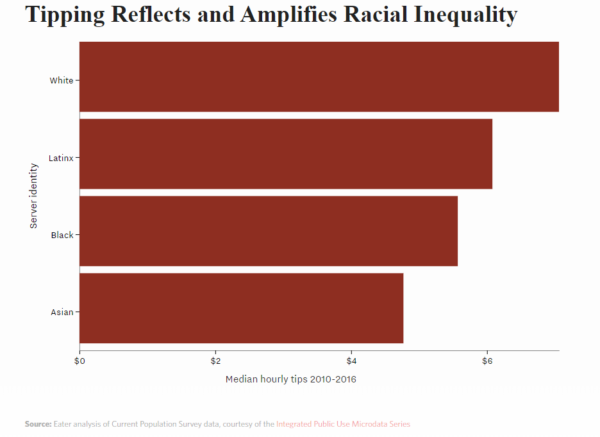I’ve been considering changing the way I tip my servers when dining out— to level the playing field for people of color. I want to tip people of color more generously.
Why, you ask? How much people tip, and to whom, can be subtly affected by biases as much as anything else. This means that, unconsciously, we eye our servers and make quick decisions based on race, gender, perceived sexuality and age of the server.
People tend to tip based on the quality of service, commonly in the 15-20 percent range. These are good guidelines to follow, but servers of color and women have been shown to receive the lower end of this range.

I want to focus only on race because our country has come a long way in addressing gender pay disparities and inequities, i.e. how much women make in comparison to men. We now even have Equal Pay Day, which brings attention to the issue. It is the hope that through this and other campaigns that businesses will get it and begin to pay equal wages.
Equal Pay Day is hard to criticize, but it fails when it minimizes women of color and mentions them almost as an afterthought. Brown women, even with a professional degree, make less than their white female counterparts.
Pay disparities for people of color are prevalent in the service industry, where workers tend to depend on tips for their salary.
This isn’t new. Tipping was used in the 19th century as an excuse not to pay wages to newly freed slaves. Making workers rely on tips gave restaurant owners the ability to hire workers at little cost. It became the workers’ responsibility to make sure they earned a living wage, rather than the employers’. To see this as a good thing is a logical fallacy – would any worker choose to give up wages and be tipped instead? Would you?
Eater conducted an analysis of data from the US Census, Bureau of statistics and the Equal Employment Opportunity Commission, factually documenting how tipping encourages racial profiling.
In most states, all tipped workers make less than minimum wage. Not only did servers of color make less than white servers, but patrons of color also got a raw deal. 66 percent of servers witness co-worker bias in providing sub-par service to customers of color.
Workers of color also were shown to make less because they don’t get jobs at high-end restaurants, where tips are better, and they are more likely to be put in a back-of-house position, where wages are poorer.
“In a tip-based system, nonwhite servers make less than their white peers for equal work. Consider also the power imbalance between tippers, who are typically male, and servers, 70 percent of whom are female, and consider that the restaurant industry generates five times the average number of sexual harassment claims per worker,” says Jay Porter, a former restaurant owner in San Diego. “And that in many instances employers have allegedly misused tip credits, which let owners pay servers less than minimum wage if tipping makes up the difference.”
In Seattle, our workers benefit from one of the highest minimum wages in the country and some restaurants have gone to a no tipping system. But not many. The majority continue to pay the minimum wage and allow for tipping.
I’ve been mulling over the best practice for me to help even the playing field. Paying equally across the board only keeps the status quo. My top solution is tipping in the following way: white male servers 15 percent, White female servers 18 percent, all workers of color 20 percent.
This is challenging because I still have the notion that workers must “earn their tip” and provide excellent service. And what do I do when I visit a local espresso stand where the tips are shared among multiple workers? If the cashier is white, how do I tip? If the cashier is black the next day, do I tip differently?
More To Read
January 17, 2024
Which costs more: Shoplifting or wage theft? The answer might surprise you
Wage theft continues to rob workers — but Washington is stepping up
May 1, 2023
Before the Triangle Shirtwaist Fire, Women Tried To Warn the Unions
How a teenage immigrant helped build one of the most powerful labor unions in the United States
March 10, 2022
Equal Pay Day 2022: Work Still Remains to Advance Gender Equity
Women’s history month and Equal Pay Day give us the opportunity to celebrate progress, and acknowledge the collective work we have ahead.

Conor Miller
The Economic Opportunity Institute is a not-for-profit public policy institute working to promote economic security and educational opportunity for all. How does tipping a white server less help a POC get tipped more? How are you working to promote economic economic security and educational opportunity for all?
Oct 4 2020 at 9:11 PM
Verna
This article is straight disgusting. Tipping based on anything but service, like race or gender, is wrong. Just disgusting.
Jun 22 2021 at 8:13 AM
Britt
This is literally the definition of discrimination. Surely you must realize that…
Jan 2 2022 at 11:06 PM